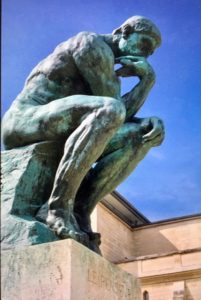The Scottish poet Robert Burns (1759–1796) wrote the following verse, expressed here in English prose: “O, would some Power give us the gift to see ourselves as others see us! It would free us from many a blunder and foolish notion.” The gift he was speaking of would be a blessing in any age, but is especially so in ours. The reason is that for several generations we have taught our young people not only that their self-image is most important, but that it also should always be an unquestionably wonderful image. The result is that many of us have formed false views of human nature, good and evil, and the meaning and challenge of life.
Interestingly, a century and a half later an American journalist, short story writer, and poet, Ambrose Bierce (1842-1914), wrote a satirical dictionary with a therapeutic view of human nature that can cure our false notions about ourselves. Titled “The Devil’s Dictionary,” it was praised as “probably the most brilliant work of satire written in American literature” and perhaps “one of the greatest in all of world literature.” It covers a wide range of definitions from Abasement to Zoology. (The book, an Oxford University Press paperback, is available at bookstores and Amazon.com.)
The twenty definitions that follow reveal the elevation of self that penetrates virtually everything we say and do. Taken together, these definitions explode the notion that we humans are wise and good by nature. And therein lies the therapy. Each definition in its own way mocks human pride and self-exaltation and thus offers a penetrating (if painful) insight into the side of the human condition our culture has denied for a dangerously long time.
Absurdity: A statement of belief manifestly inconsistent with one’s own opinion.
Accuse: To affirm another’s guilt or unworth; most commonly as a justification of ourselves for having wronged him.
Admiration: A polite recognition of another’s resemblance to ourselves.
Alone: In bad company.
Bigot: One who is obstinately and zealously attached to an opinion that you do not entertain.
Bore: A person who talks when you want him to listen.
Calamity: Misfortune to ourselves [or] Good fortune to others.
Comfort: A state of mind produced by contemplation of a neighbor’s uneasiness.
Conservative: A statesman who is enamored of existing evils, as distinguished from the Liberal, who wishes to replace them with others.
Egotist: A person of low taste, more interested in himself than in me.
The letter “I”: The first letter of the alphabet, the first word of the language, the first thought of the mind, the first object of affection.
Infidel: In New York, one who does not believe in the Christian religion; in Constantinople, one who does.
Lawyer: One skilled in circumvention of the law.
Man: An animal so lost in rapturous contemplation of what he thinks he is as to overlook what he indubitably ought to be.
Neighbor: One whom we are commanded to love as ourselves, and who does all he knows how to make us disobedient.
Orphan: A living person whom death has deprived of the power of filial ingratitude.
Positive: Mistaken at the top of one’s voice.
Revolution: In politics, an abrupt change in the form of misgovernment.
Scriptures: The sacred books of our holy religion, as distinguished from the false and profane writings on which all other faiths are based.
Self-esteem: An erroneous appraisement.
Are these definitions exaggerated? Indeed. Are they exclusively focused on the uncomplimentary side of human nature? Absolutely. Do they therefore ignore much that is good in us? Unquestionably. Do many, if not all, of the definitions describe our personal failings and make us feel somewhat ashamed? They certainly can, and that is a blessing rather than a curse! (Although today’s culture teaches that feeling ashamed is always harmful, that notion is false. When we have done something shameful it is both psychologically and spiritually appropriate to feel ashamed. In such cases, that feeling is the necessary prelude to sorrow, repentance, humility, and harmony with others.)
Ambrose Bierce was not a believer in Christianity or any other religion, and therein lies a great irony, for his satirical dictionary underscores a central Judeo-Christian concept better than most religious writers have managed to. That concept is the imperfection of humankind, also known as Original Sin. The better we understand that imperfection, the more we can realize its danger, follow the way of humility, and move beyond self-esteem to self-improvement.
Thank you, Ambrose Bierce, for providing that saving insight. May you rest forever in God’s peace.
Copyright © 2022 by Vincent Ryan Ruggiero. All rights reserved.




